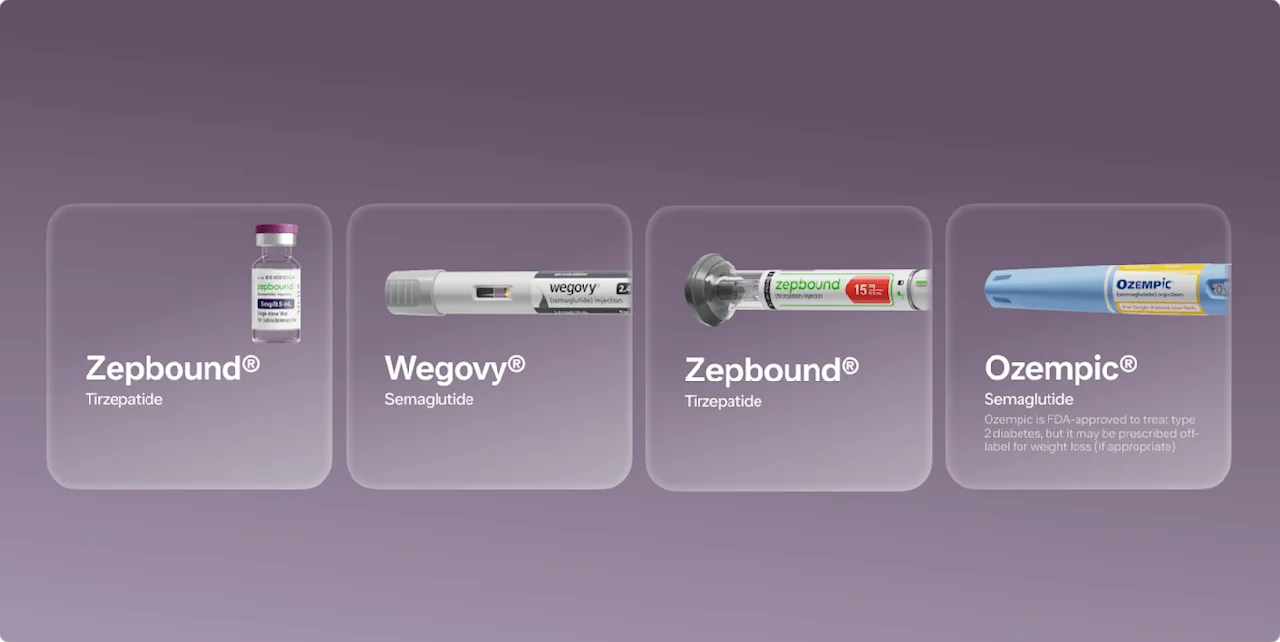Here's what we'll cover
Here's what we'll cover
Ozempic is an injectable prescription medication that treats type 2 diabetes and can be prescribed off-label for weight loss. But like many medications, Ozempic can have possible side effects but is a headache one of them? The answer is, not directly. However, some of Ozempic’s known side effects can lead to headaches.
Keep reading to learn more about headaches as a potential side effect of Ozempic and what to do about them.
How does Ozempic work
Ozempic is a brand-name prescription drug. It contains the active ingredient semaglutide and belongs to a class of medications known as glucagon-like peptide 1 (GLP-1) agonists. You inject it under the skin once weekly.
The Food and Drug Administration (FDA) approved Ozempic to improve blood sugar control in adults with type 2 diabetes. It’s also approved to reduce the risk of serious cardiovascular problems like heart attacks and strokes in adults with type 2 diabetes and heart disease. Additionally, healthcare providers prescribe Ozempic off-label to promote weight loss in conjunction with diet and exercise.
Ozempic mimics the effects of GLP-1, a protein naturally produced in the body. It lowers blood sugar levels by increasing insulin release by the pancreas. Insulin is a hormone that helps glucose (sugar) move out of your bloodstream and into your cells. Once inside your cells, glucose is used as an energy source.
In addition, Ozempic slows gastric emptying, the process by which your stomach empties into your small intestine. Slowing down how quickly food leaves the stomach after a meal can make you feel fuller, which helps to control how much you eat. Like other GLP-1 agonists, Ozempic can help people lose weight when combined with other lifestyle changes, like eating a reduced-calorie diet and boosting physical activity.
Ozempic Important Safety Information: Read more about serious warnings and safety info.
Does Ozempic cause headaches?
Headaches are not a common side effect of Ozempic (semaglutide). Headaches alone aren’t mentioned as a side effect in Ozempic clinical trials. In other clinical trials of a higher dose of semaglutide for weight management, 15.2% of the participants receiving the drug experienced headaches. However, 12.2% of participants receiving a placebo (a treatment with no active medication) also experienced headaches during this trial.
Causes of headaches while on Ozempic
In certain situations, Ozempic treatment has been reported in connection with other side effects, such as dehydration and hypoglycemia (low blood sugar). Occasionally, these side effects may result in headaches.
Low blood sugar
While Ozempic is designed to lower blood sugar levels that run high in people with type 2 diabetes, it can be dangerous if sugar levels drop too low, known as hypoglycemia. While the ideal range for blood sugar varies depending on an individual’s health conditions, hypoglycemia is generally defined as a blood sugar measurement of less than 70 mg/dL.
Taking Ozempic while taking other diabetes medications, such as insulin, increases the risk of hypoglycemia. In studies, less than 1% of participants receiving Ozempic for weight management experienced hypoglycemia. In contrast, rates of hypoglycemia were almost 25% in studies of participants receiving Ozempic plus insulin or other diabetes medications.
Headache is a possible symptom of hypoglycemia. Some evidence also links low blood sugar as a trigger for migraine or tension headaches. When the brain senses low sugar levels, it releases signals that increase blood flow. While the full connection between hypoglycemia and headaches remains unclear, experts believe this alteration in blood flow may contribute to headache pain.
Besides headache, other signs and symptoms of low blood sugar may include:
Feeling irritable
Dizziness
Sweating
Irregular heartbeat or palpitations (fast or “fluttering” heartbeat)
Shakiness
Hunger
Confusion or drowsiness
Blurry vision
Your healthcare provider will advise you on what to do if hypoglycemia occurs. They may recommend keeping glucose tablets, glucagon injections, or another readily-absorbed source of sugar on hand to be prepared in case of a hypoglycemic emergency. If hypoglycemia is severe or doesn’t resolve with treatment, call 9-1-1 for immediate medical attention. Severe hypoglycemia can lead to seizures, loss of consciousness, coma, or even become life-threatening.
If your healthcare provider prescribes Ozempic along with other diabetes medications, they’ll probably suggest monitoring your blood sugar levels at home more than usual, especially when you first start treatment and after Ozempic dose increases. In some cases, they may adjust the dosage of your insulin or other diabetes medications to help prevent hypoglycemia and related symptoms.
Dehydration
Headaches may be a symptom of dehydration. Dehydration occurs when your body loses more fluid than you’re taking in. For example, a person can quickly get dehydrated if they’re sweating a lot while working outside on a hot day and not drinking much water. Dehydration may also occur following bouts of vomiting or diarrhea.
In clinical trials, the most common side effects of Ozempic were nausea, vomiting, and diarrhea. One or more of these side effects occurred in about 35% of those receiving Ozempic, compared to only 15% of those receiving a placebo. Fortunately, the stomach-upsetting effects of Ozempic are usually temporary. These side effects are most common during the initial treatment period, when the dosage of Ozempic is being increased.
Studies suggest that dehydration results in a heightened body response to pain, and changes in total body water may impact blood flow to the brain. Both of these mechanisms could lead to headache pain. Also, dehydration seems to trigger more frequent or severe headaches in people with pre-existing migraines, a neurological disorder that causes headaches and other symptoms.
To avoid dehydration while taking Ozempic, it’s best to drink plenty of fluids as part of your daily routine. Dehydration is often accompanied by dizziness, fatigue, dry mouth, dark urine, and muscle cramps; if these symptoms occur while taking Ozempic, try to increase your water intake.
If the stomach side effects of Ozempic aren’t going away, talk to your healthcare provider for advice. Also, becoming dehydrated can cause kidney problems or worsen existing kidney problems. Acute (sudden) kidney failure has been reported in people taking medications similar to Ozempic. If you have kidney problems, tell your provider right away if you’re having vomiting and diarrhea from Ozempic. They may need to check your kidney function.
Common causes of headaches
Having occasional headaches during Ozempic treatment is probably not caused by the medication. An estimated 16% of the world’s population experiences a headache on any given day. Headache disorders or stand-alone headaches are super common; as many as 50% of individuals have some type of headache disorder.
Extensive research has pinpointed several important factors that play a role in triggering headaches. Common causes of headaches or migraines include:
Stress
Changes in your sleep schedule, like not getting enough sleep
Hormone fluctuations, particularly during menstruation
Changes in caffeine consumption
Alcohol or hangover
Changes in weather
Lighting
Certain foods, such as artificial sweeteners
Exposure to certain smells or perfumes
Allergens, such as pollen (sinus headache)
Headache triggers vary for each individual. Identifying personal triggers, such as managing stress, is important in successfully preventing or banishing headaches. Journaling or using an app to track your diet, activities, and symptoms can help you identify triggers and patterns.
How to treat headaches while taking Ozempic
Several medications are available to treat or prevent headaches, but some simple lifestyle changes could also help reduce the frequency or severity of headaches while taking Ozempic.
Headache Treatment Options
The following treatment approaches include general advice for managing headaches, regardless of whether or not Ozempic is a contributing factor.
Prevention of headaches focuses on trigger identification and elimination. Keeping a headache diary, which involves logging headache timing and potential factors influencing each headache, assists in identifying specific headache triggers. In some cases, non-drug treatment like cognitive behavioral therapy (CBT) may be helpful, particularly in those with frequent stress-induced headaches.
Over-the-counter (OTC) pain relievers are often effective for easing occasional or recurrent headaches. Healthcare providers commonly recommend taking acetaminophen (Tylenol) or non-steroidal anti-inflammatory drugs (NSAIDs) like ibuprofen for mild headaches. Excedrin, which combines aspirin and acetaminophen with caffeine, is another option to ease headache pain.
Ozempic doesn’t interact with OTC pain relievers, so they are generally safe to take together.
In some cases, OTC pain relievers aren’t enough. Consult a healthcare provider if headache symptoms do not respond to OTC medications. If your provider determines you’re experiencing migraine, they may recommend prescription treatment, such as:
Triptans, like sumatriptan (brand name: Imitrex) or zolmitriptan (Zomig), come in various forms, including oral tablets, nasal sprays, and subcutaneous injections.
Combination analgesic drugs containing butalbital, such as Fioricet, Fiorinal, or Esgic
CGRP antagonists, including rimegepant (Nurtec ODT), ubrogepant (Ubrelvy), or zavegepant (Zavzpret), some of which are available as oral tablets or nasal sprays. CGRP antagonists might be considered for people that don’t respond to triptans or OTC pain relievers. While more commonly prescribed for migraine prevention, CGRP antagonists also have some effectiveness in managing acute headache pain.
Preventative drugs like topiramate (Topamax), beta blockers, or calcium channel blockers.
Whether a headache is a side effect of Ozempic or not, managing headaches centers around prevention and treatment. Talk to a healthcare provider to determine if your headaches require further medical evaluation or treatment.
DISCLAIMER
If you have any medical questions or concerns, please talk to your healthcare provider. The articles on Health Guide are underpinned by peer-reviewed research and information drawn from medical societies and governmental agencies. However, they are not a substitute for professional medical advice, diagnosis, or treatment.
American Migraine Foundation. (2017). Top 10 migraine triggers and how to deal with them. Retrieved from https://americanmigrainefoundation.org/resource-library/top-10-migraine-triggers/
Arca, K. N. & Singh, R. B. H. (2021). Dehydration and headache. Current Pain and Headache Reports, 25(8), 56. doi:10.1007/s11916-021-00966-z. Retrieved from https://www.ncbi.nlm.nih.gov/pmc/articles/PMC8280611/
Food and Drug Administration. (2022). Ozempic (semaglutide) prescribing information. Retrieved from https://www.accessdata.fda.gov/drugsatfda_docs/label/2022/209637s012lbl.pdf
Haghdoost, F. & Togha, M. (2022). Migraine management: non-pharmacological points for patients and health care professionals. Open Medicine, 17(1), 1869-1882. doi:10.1515/med-2022-0598. Retrieved from https://www.ncbi.nlm.nih.gov/pmc/articles/PMC9691984/
Islam, M. R. & Nyholt, D. R. (2022). Glucose-related traits and risk of migraine - a potential mechanism and treatment consideration. Genes, 13(5), 730. doi:10.3390/genes13050730. Retrieved from https://www.ncbi.nlm.nih.gov/pmc/articles/PMC9141901/
Marso, S. P., Bain, S. C., Consoli, A., et al. (2016). Semaglutide and cardiovascular outcomes in patients with type 2 diabetes. New England Journal of Medicine, 375, 1834-1844. doi:10.1056/NEJMoa1607141. Retrieved from https://www.nejm.org/doi/full/10.1056/nejmoa1607141
National Headache Foundation. (2007). Hypoglycemia. Retrieved from https://headaches.org/hypoglycemia/
Schwedt, T. J. & Garza, I. (2023). Acute treatment of migraine in adults. Retrieved from https://www.uptodate.com/contents/acute-treatment-of-migraine-in-adults
Stovner, L. J., Hagen, K., Linde, M., & Steiner, T. J. (2022). The global prevalence of headache: an update, with analysis of the influences of methodological factors on prevalence estimates. The Journal of Headache and Pain, 23, 34. doi:10.1186/s10194-022-01402-2. Retrieved from https://thejournalofheadacheandpain.biomedcentral.com/articles/10.1186/s10194-022-01402-2
Wilding, J. P. H., Batterham, R. L., Calanna, S., et al. (2021). Once-weekly semaglutide in adults with overweight or obesity. New England Journal of Medicine, 384, 989-1002. doi:10.1056/NEJMoa2032183. Retrieved from https://www.nejm.org/doi/full/10.1056/NEJMoa2032183












